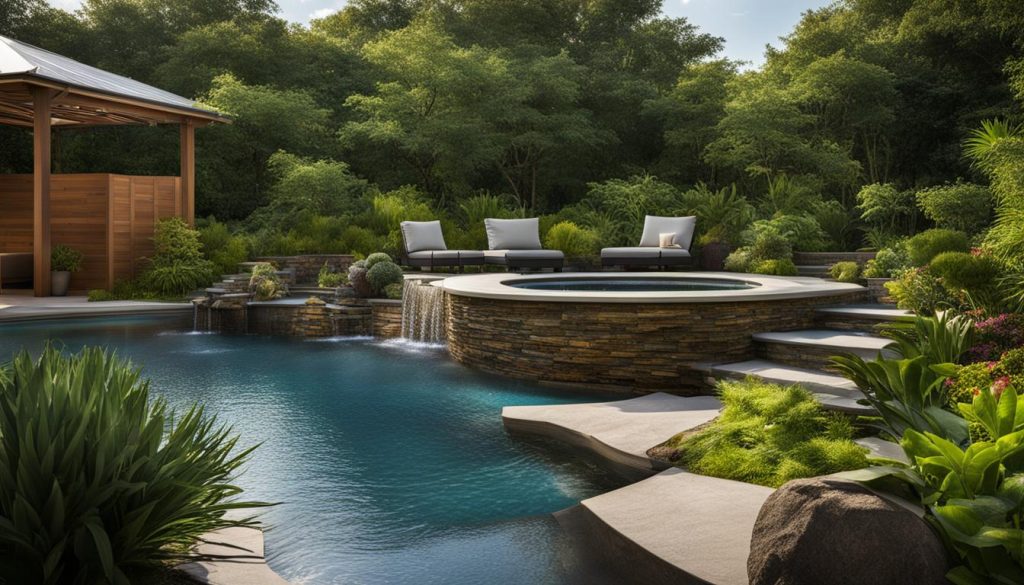Welcome to our guide to eco-friendly pool design in Canada. Are you considering building a pool in your backyard? It’s important to think about the environmental impact of your choices. By opting for sustainable practices, you can create a beautiful green oasis that is both visually appealing and eco-conscious. In this section, we will explore the concept of eco-friendly pool design and the importance of making sustainable choices for your pool.
Why should you choose an eco-friendly pool design? The answer is simple. Traditional pool designs have a significant environmental impact as they consume vast amounts of energy and water. By choosing to go green, you can minimize that impact. But what exactly is eco-friendly pool design? Simply put, it’s the use of sustainable practices and materials to make your pool more energy-efficient and reduce its ecological footprint.
Through our guide, we’ll explore the different sustainable choices you can make in pool design and maintenance. From the materials you choose to the equipment you install and the strategies you implement, we’ll show you how to create an eco-friendly pool that not only looks great but also has a positive impact on the environment.
So, let’s dive in and explore the world of sustainable pool design together!
Why Choose an Eco-Friendly Pool Design?
At Pool Designers, we believe in making environmentally-conscious choices for our pools. Choosing an eco-friendly pool design has numerous benefits that can positively impact the environment and your pool’s overall functionality.
Traditional pools have a significant environmental impact due to excessive water usage, energy consumption, and the use of harmful chemicals. On the other hand, eco-friendly pool designs prioritize sustainable practices to minimize this impact and create a greener future.
| Environmental Impact of Traditional Pools | Benefits of Eco-Friendly Pool Designs |
|---|---|
| Excessive water usage | Water conservation strategies |
| Energy consumption from pool equipment | Energy-efficient pool equipment |
| Use of harsh chemicals | Sustainable water practices |
By choosing an eco-friendly pool design, you can minimize the negative impact on the environment and ensure a sustainable future for generations to come. In the next sections, we will explore various sustainable practices and elements that can be incorporated into your pool design.
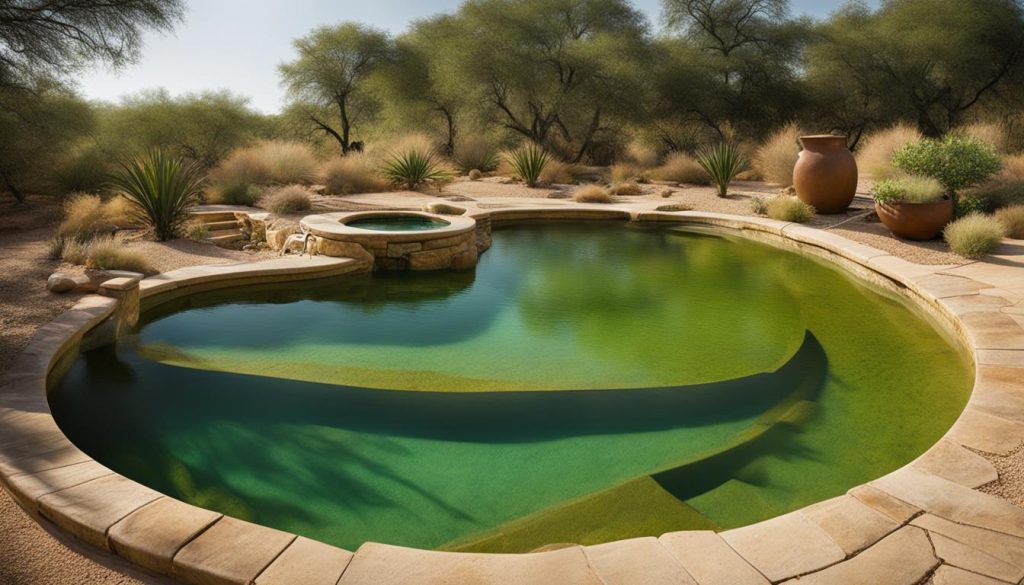
Sustainable Materials for Pool Construction
Choosing sustainable materials for your pool construction is an essential element of an eco-friendly pool design. Not only do they offer a beautiful aesthetic, but they also reduce the ecological footprint of your pool.
One eco-friendly option is the use of recycled materials such as glass and plastic. These materials are durable and can be easily repurposed, turning waste into a valuable resource. Natural stones such as limestone or granite are also popular sustainable choices. Not only do they offer a timeless look, but they also require less energy to extract and process than other building materials.
Low-VOC finishes are another eco-friendly alternative used for pool surfaces. These finishes do not emit hazardous chemicals, providing a healthier and safer environment for swimmers. They are also available in a variety of colours and textures to suit your desired pool design.
In addition to sustainable material choices, eco-friendly pool construction practices are also crucial. Green building aims to minimize the environmental impact of the construction process by reducing waste, energy consumption, and water usage.
For example, using locally-sourced materials reduces transportation emissions and supports the local economy. Opting for pre-fabricated pool components minimizes on-site waste, saving resources and reducing pollution.
Incorporating sustainable materials and construction practices into your eco-friendly pool design is a key step towards creating a green oasis that is both visually appealing and environmentally-conscious.
Energy-Efficient Pool Equipment
When it comes to eco-friendly pool design, it’s vital to consider the energy efficiency of your pool equipment. By choosing energy-saving alternatives, you can minimize energy consumption and decrease your pool’s impact on the environment. Let’s explore some eco-friendly pool technology and equipment options:
Variable Speed Pumps
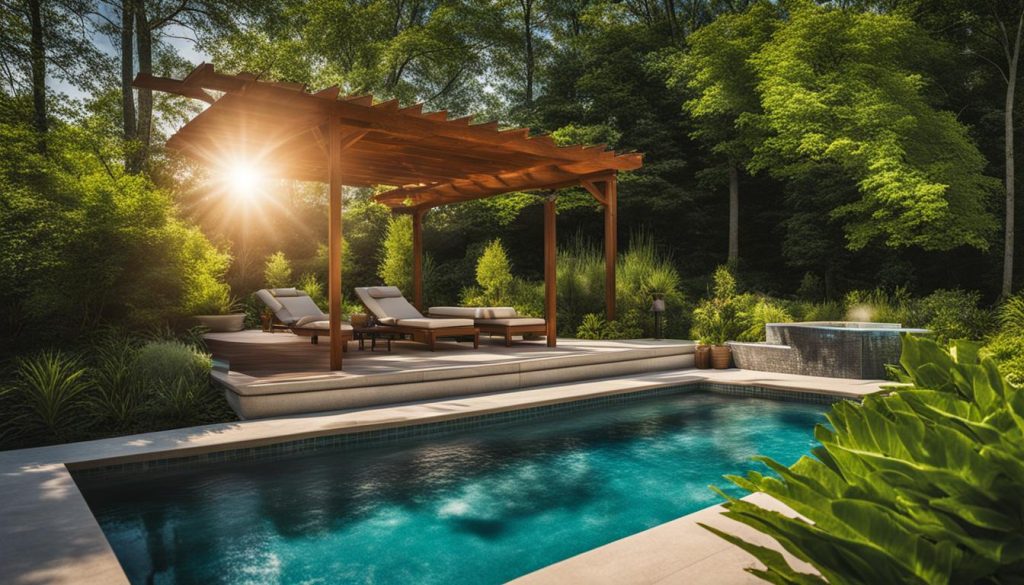 One of the most significant energy-saving options for your pool is a variable speed pump. Compared to traditional single-speed pumps, variable speed pumps use less energy and are more efficient in their operations. Not only do they consume less electricity, but they also reduce noise and prolong the lifespan of the pump. In fact, by choosing a variable speed pump, you can save up to 90% on your pool’s energy costs!
One of the most significant energy-saving options for your pool is a variable speed pump. Compared to traditional single-speed pumps, variable speed pumps use less energy and are more efficient in their operations. Not only do they consume less electricity, but they also reduce noise and prolong the lifespan of the pump. In fact, by choosing a variable speed pump, you can save up to 90% on your pool’s energy costs!
Solar-Powered Heating Systems
Another eco-friendly option for your pool is to use solar-powered heating systems. These systems use solar energy to heat your pool water and come in both passive and active varieties. Passive solar heating systems work by circulating water through channels that are warmed by the sun, while active solar heating systems use solar collectors to heat the water directly. In addition to their energy-saving benefits, solar-powered heating systems can also extend your swimming season by keeping your pool at a comfortable temperature during colder months.
LED Lighting
Incorporating LED lighting into your pool design is another energy-efficient choice. Compared to traditional incandescent bulbs, LED lights consume a fraction of the power and have a much longer lifespan. In addition to being eco-friendly, LED lights also offer a wide range of color options and can create a stunning ambiance around your pool at night.
| Energy-Efficient Pool Equipment | Energy Consumption | Lifespan |
|---|---|---|
| Variable Speed Pump | Up to 90% less | 5-10 years |
| Solar-Powered Heating Systems | No electricity required | 20+ years |
| LED Lighting | Up to 80% less | 10-20 years |
By implementing these energy-efficient pool equipment options, you can reduce energy consumption and minimize the environmental impact of your pool. Plus, you can enjoy the added benefits of cost savings and a visually appealing design!
Water Conservation Strategies
As we strive towards a greener future, water conservation is becoming an increasingly important consideration for eco-friendly pool design. Implementing sustainable water practices not only saves water but also minimizes the need for chemical treatments, resulting in a healthier environment for you and your family. Let’s explore some effective water conservation strategies for your eco-friendly pool.
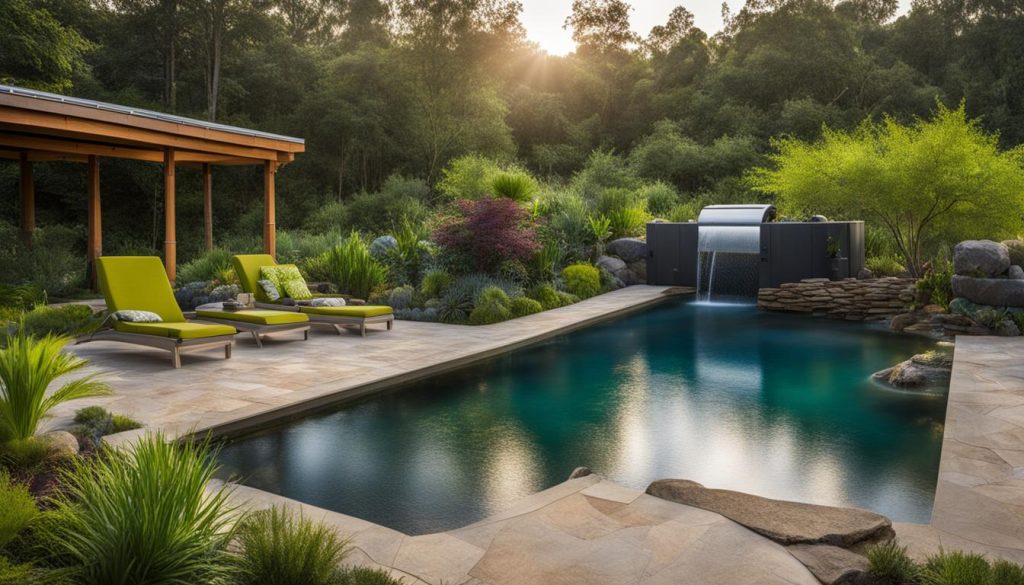
Smart Water Management
Smart water management systems, such as automatic pool covers and pool automation technology, can greatly reduce the amount of water evaporated from your pool, resulting in minimized water waste. Automatic pool covers also serve as a safety feature by preventing accidental falls into the pool. Pool automation technology allows you to remotely control your pool’s functions, enabling you to turn on/off pumps, adjust water temperature, and manage chemical levels efficiently.
Rainwater Harvesting
A rainwater harvesting system can collect and store rainwater, using it to top up your pool or water your garden. By reducing the amount of freshwater consumption, and minimizing the need for chemical treatments for your pool, rainwater harvesting is a sustainable solution for eco-friendly pool maintenance. Moreover, harvesting rainwater can also help to mitigate stormwater runoff, reducing the risk of erosion and flooding in your yard.
Sustainable Chemical Treatments
By choosing sustainable chemical treatments, you can conserve water while maintaining a clean and hygienic pool. Consider using enzymes and natural cleaners that reduce the amount of chlorine and other harsh chemicals needed to balance the water chemistry. Not only are these treatments better for the environment, but they are also easier on your pool’s equipment and more gentle on your skin.
Implementing water conservation strategies is an integral part of eco-friendly pool maintenance. By using sustainable water practices, you can reduce water waste, minimize chemical treatments, and maintain a safe, healthy environment for your family to enjoy.
Native Landscaping and Natural Filtration
When we think of creating an eco-friendly pool, we often focus on the pool itself and overlook the surrounding landscape. However, incorporating native landscaping and natural filtration systems can significantly enhance the sustainability of your pool surroundings.
Native landscaping involves strategically planting vegetation that is native to your local area. By doing so, you can reduce the need for water, fertilizers, and pesticides while providing a habitat for local wildlife. Native plants are also better adapted to local weather conditions, which means they require less maintenance and care.
Natural filtration systems, such as wetlands or biofilters, can further enhance the sustainability of your pool surroundings. These systems use natural processes to filter water, reducing the need for chemical treatments and energy-intensive filtration systems. Plus, they provide a natural habitat for wildlife and can contribute to the aesthetic appeal of your pool area.
The Benefits of Native Landscaping and Natural Filtration
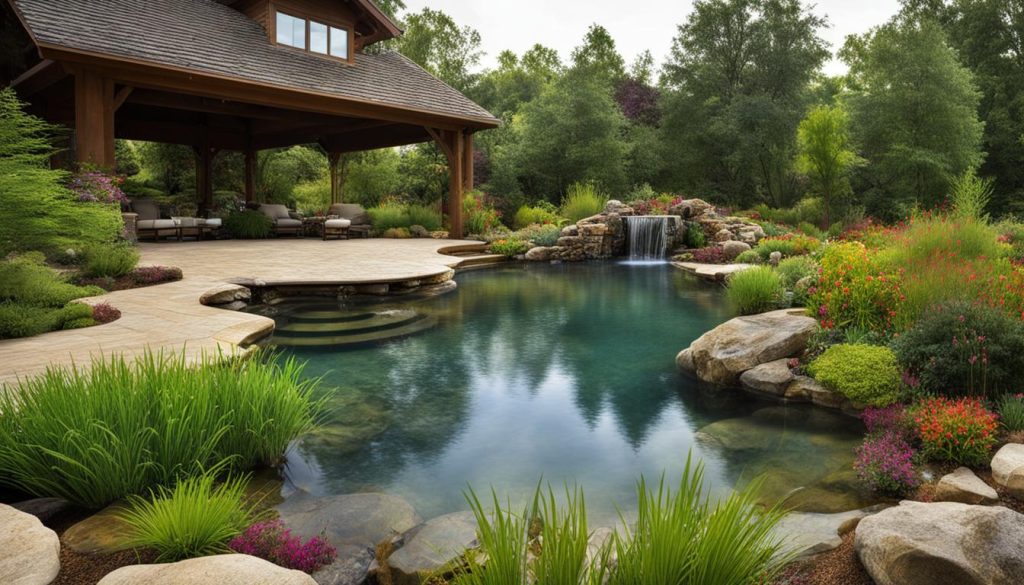
| Benefits of Native Landscaping | Benefits of Natural Filtration |
|---|---|
| Reduces water use and the need for fertilizers and pesticides | Uses natural processes to filter water, reducing the need for chemical treatments |
| Provides a habitat for local wildlife | Contributes to the aesthetic appeal of your pool area |
| Requires less maintenance and care | Provides a natural habitat for wildlife |
As you can see, incorporating native landscaping and natural filtration systems into your eco-friendly pool design can offer a range of benefits. Not only do they contribute to the overall sustainability of your pool area, but they also provide a beautiful and natural aesthetic that can enhance your enjoyment of your pool and your backyard.
Maintaining Your Eco-Friendly Pool
Keeping your eco-friendly pool clean and sustainable is key to ensuring it remains environmentally-conscious and visually appealing. Here are some tips and techniques for eco-friendly pool maintenance:
Use Environmentally-Friendly Pool Cleaning Products
Switching to green pool cleaning products is an easy way to maintain your eco-friendly pool. Chemical-based pool cleaners can harm the environment and are not suitable for a sustainable pool. Instead, opt for natural solutions such as baking soda, vinegar, or hydrogen peroxide to maintain a clean and chemical-free pool.
Practice Efficient Water Management
Water conservation is a crucial element of eco-friendly pool maintenance. By using a pool cover, you can reduce water evaporation and preserve water resources. Additionally, you can set up a smart water management system that monitors the pool’s water level and automatically adjusts the water supply to avoid wastage. Regularly checking for leaks in your pool equipment and fixing them immediately can also help conserve water resources.
Reduce Energy Consumption
Reducing energy consumption is an essential element of maintaining an eco-friendly pool. Opt for energy-efficient pool equipment such as variable speed pumps, solar-powered heating systems and LED lighting to minimize your pool’s impact on the environment. You can also reduce energy consumption by limiting pool use during peak energy hours and using a pool timer to regulate pool equipment operation.
Schedule Regular Maintenance
Scheduling regular maintenance is crucial for keeping your eco-friendly pool in tip-top shape. Regular cleaning and servicing of pool equipment, including filters, pumps, and heaters, can help prevent damage, prolong pool life, and reduce energy consumption. Partnering with a pool maintenance professional who shares your commitment to sustainability can help ensure your pool stays eco-friendly and well-maintained.
FAQ
Why should I choose an eco-friendly pool design?
Choosing an eco-friendly pool design is important for minimizing the environmental impact of traditional pools. By incorporating sustainable practices, you can create a pool that is both visually appealing and environmentally-conscious.
What are some sustainable materials used for pool construction?
Some eco-friendly options for pool construction include recycled materials, natural stones, and low-VOC finishes. These materials not only provide a beautiful aesthetic but also reduce the ecological footprint of your pool.
How can energy-efficient pool equipment help reduce energy consumption?
Energy-efficient pool equipment, such as variable speed pumps, solar-powered heating systems, and LED lighting, can help reduce energy consumption and minimize your pool’s impact on the environment. These advancements in eco-friendly pool technology are designed to be more efficient and sustainable.
What are some water conservation strategies for an eco-friendly pool?
Water conservation strategies for eco-friendly pools include rainwater harvesting systems and smart water management technologies. Implementing these sustainable water practices can help save water and reduce the need for chemical treatments in your pool.
How can native landscaping and natural filtration enhance the sustainability of my pool surroundings?
By strategically planting native vegetation and incorporating natural filtration systems, such as wetlands or biofilters, you can enhance the overall sustainability of your pool surroundings. These elements contribute to the ecological balance of your pool area.
What are some tips for maintaining an eco-friendly pool?
To maintain an eco-friendly pool, it is recommended to use environmentally-friendly pool cleaning products, practice efficient water management, and regularly monitor the pool’s water quality. These sustainable pool care practices help keep your pool clean and green.

